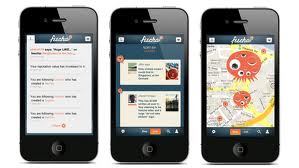Is the future of SoLoMo in Asia?

Singapore is the smartphone king of the world.
With a staggering 62 per cent penetration rate for smartphones of all kinds (well in reality mostly Apple ones), it stands to reason that geo-location apps should be big news.
Except that they really aren’t. The big SoLoMo (a lovely and slightly disingenuous term meaning Social Location Mobile) app hasn’t really emerged from Asia yet.
Quite a few conferences you go to in Asia talk about the future of mobile and marketing as being both social and mobile, but the truth is that Foursquare and Facebook Places are still dominating the social side here.
From my side I have to admit that I use the Google Maps direction functionality far more than any app. Primarily because for all of the great location based chatter, there isn’t anything out there knocking me out.
That leads to the obvious question. Where is the next geo-location genius coming from? And why would it not be from a smartphone obsessed region.
Actually, there are quite a few people in Asia trying to be the next big thing in SoLoMo apps, and some really excellent models that didn’t quite work.
On a sad note, I think one of the most unfortunate start-up failures this year had the potential to be a game-changer, and I sincerely hope it pops up again in the US.
Chalkboard was a mobile based, location based ad network which basically had the capability to serve targeted ads to people walking past your business. Pretty smart idea to be able to push ads for John’s burger shack at lunchtime, to people walking near to John’s burger shack.
The reasons for the business being closed down were based more around not finding the right kind of funding than it being an utter failure. So here’s hoping the idea pops up again elsewhere.
On a more positive note, there are a couple of companies over here trying hard not to simply copy the FourSquare model, who you might see popping up some time soon.
Feecha, is a Singapore based app which kind of takes the social out of SoLoMo and concentrates on serendipity over social influence.
With an insanely cute UI, the point of the app is simple. Cool things happen all around you, but how would you know unless someone you knew also knew.
So instead of relying on networks of friends to tell you things, Feecha allows you to look around the area you are in for interesting things posted by anyone, be it some cool street art, a great place to eat or a big star giving an impromptu concert two streets over.
So in principle, the community is…everyone. And the postings thrive on attention, so a natural order will emerge of what’s cool and enduring, while time specific content will fade into obscurity.
Will it work on a bigger scale? Honestly I don’t see why not and it will only be a matter of time before they work on pushing their boat out to foreign climes. I could really see this kind of concept going down a storm in somewhere like New York or London where one of your biggest problems is simply getting to know your own neighbourhood.
The Japanese have something similar, in the form of Eyeland. This is an app that has just hit 500,000 users and is rapidly growing in popularity.
The basic principle is the same. Less of the rigid social hierarchy of most sharing apps and more of the pure crowdsourced notion of just finding out what is happening in the next street.
The bad news for Feecha is that they’ve just launched an English language version of their app in Singapore, which also means that it should be a matter of time before they look at spreading their wings beyond Asia.
So is that the future of mobile engagement? With the likes of Path, the West seems to have gone down the road of more personal, manageable social influence networks.
After the juggernaught mass of Facebook and Twitter, some people do seem to be looking for something more personal, more private and more controlled.
Asia looks like its heading down the open, everyone is a potential influencer road.
I love the fact that this approach could even help bring communities together.
I love the fact that you are more than likely to find out something awesome from someone you don’t know, and that the quality of the post and not the influence the person has wins.
I love the fact that it doesn’t matter how many friends you have, that it matters what is actually going on.
Is there a right answer? I guess it just boils down too which way works best for you. Personally, I love crowdsourcing and I love real sharing. So I’m with the Asians.





